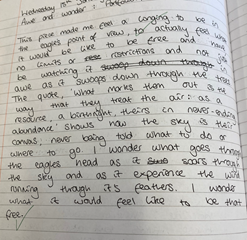There’s been a fair bit of discussion in the Press about the teaching of poetry in the new GCSEs with the suggestion that students will now have to learn 15 poems off by heart for GCSE English Literature and a threat of rote learning being applied to poetry.
Inevitably, the media presentation has been rather crude and unsubtle. Nevertheless, at EMC we’ve been a bit perplexed by the raising of this as a major worry. There are plenty of things to be concerned about with the examination reforms and the new accountability measures but this didn’t seem to us to be one of them. Nor have we noticed undue anxiety about this issue among the many teachers who we’ve seen on our ‘choosing and planning’ courses for GCSE.
We thought it worth setting the record straight, as we see it, for those who haven’t had a chance to look at all the specs:
- All of the specifications name a poem and print that poem on the exam paper – so that allows students to respond closely and discuss language, with the poem in front of them – no memorisation needed there.
- All of the specifications require a response to a second poem. In some cases, this is unseen, and in others, the choice of a second poem from the set anthology. In the case of OCR, the second poem is a named one from the anthology and a further question then asks students write about an anthology poem of their choice. The unseen is (obviously) on the paper. The unseen is (obviously) on the paper. The choice of a second poem allows students to select a poem that they feel confident to write about. Clearly it needs to be a relevant and well-chosen comparison poem but they can choose their own ground and then choose which aspects they want to focus on, in relation to the question.
It doesn’t seem to us to be unreasonable, in a Literature exam, to ask students to choose one poem to talk about that isn’t there in front of them, nor does it necessitate rote learning or wholesale memorisation. Being able to recollect some details from their chosen poem (such as the title, or use of a refrain, or sudden turn in the second stanza, or use of a particularly powerful image, or cluster of words from a particular semantic group, or the contrasting of light and dark and so on) and give a few examples, using quotation or not, doesn’t require learning by heart or massive taxing of the memory. Learning a short poem off by heart might be a fun thing to do and help you get under the skin of a poem you particularly like but it’s not necessary and it doesn’t do the job of preparing you to answer in the exam. You’d be much better off spending time thinking about what’s significant about the way this poem works, by contrast with others in the anthology.
So, if you hear that you’re going to have to get your students to learn every poem in your set anthology off-by-heart, don’t get too worried! Rote learning and wholesale memorisation are neither required nor desirable for the poetry questions in the new exams.




